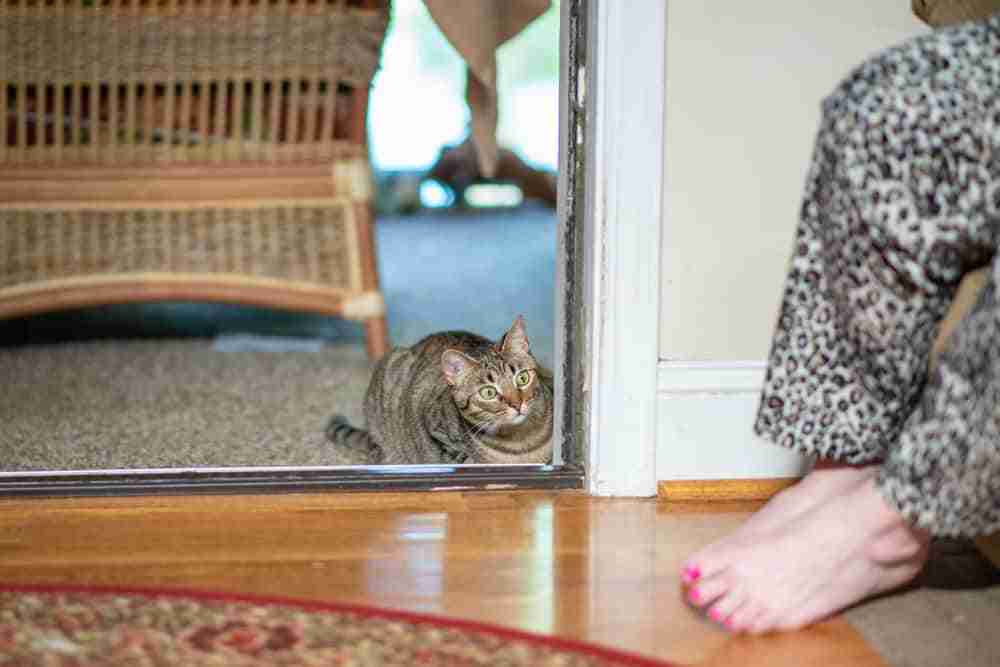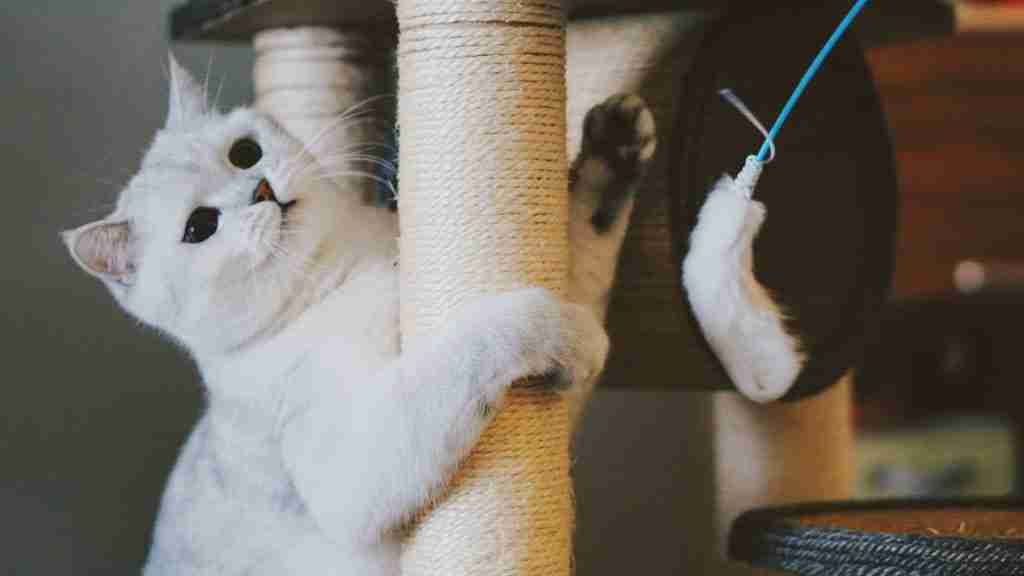Why does my cat keep attacking my feet? How do I stop my cat attacking my feet? Your cat is probably bored and doesn’t know any better! A regular program of play and some strong verbal cues should solve the problem. There is a little more to it than that but read on to learn more…
Is your cat mistaking your feet for its nemesis or the scratching post? Gosh, cats – we love them, but sometimes they can be a bit much, right? As cat owners, we adapt to the crazy behavior of our felines; it’s part of why we love them so much.
However, it’s not so much fun when you’re chilling on the couch, watching your favorite show, and your cat decides to feast on your feet. At first, a little nip is amusing and a slight annoyance, but if your cat adopts this behavior as the norm, it’s going to make your life a hassle at home. How do I stop my cat attacking my feet?
Why Does My Cat Bite My Feet?
There could be several reasons why your cat adopts the behavior of attacking your feet. First, you need to isolate where the behavior occurs. Does your cat attack you while you’re relaxing on the couch or walking around the house – or both?
Does your kitty bite you gently and leave it, or do they start lightly scratching and grabbing your feet? The way your cat decides to go about its terrorist activities says something about what’s causing the reaction.
Here are some of the common reasons why your feline is attacking your feet.

Predatory Instincts
Cats are obligate carnivores, and it’s in their instinct to be hunters. In fact, cats are the perfect killing machine, and chances are your kitty is always bringing you presents of dead birds and rodents it kills in the yard.
This hunting behavior extends into the cat’s life whenever it gets boring. It identifies your feet as a moving target and attacks your toes to satisfy its predatory instincts.
Playtime
Playtime is probably the biggest cause of cats wanting to nibble on our toes and fingers. When people play with their cats, many of them decide to push their cat around with their fingers, causing the cat to react to the movement.
Unfortunately, this is training your cat to go after your fingers and toes when they feel like they want to initiate playtime. So, if your cat is feeling bored, and they see your toes peeking out from under the blanket, there’s a chance they’ll go after them in an attempt to engage your attention.
Because They’re Bored
Boredom is another big issue for your cat. Cats are used to being outdoors prowling at night and sleeping during the day.
The problem is that many of us domesticate our cats into a daytime light cycle. As a result, they find themselves bored during the day.
If they decide your feet are something exciting, they might start biting on your toes or gnawing at your feet to get some excitement in their life.
Medical Problems
Some cats might experience changes in their behavior due to medical issues. The cat might develop an aggressive personality, requiring professional treatment from the vet to reverse the behavior.
Hyperthyroidism in cats is known to cause the onset of aggressive behavior in felines, even if the cat has no history of aggression.
Love
Some cats like to give you a little love bite out of their affection for you. Typically, these bites are gentle, and it’s your cat just wanting to let you know that it’s thinking about you.
In most cases, this behavior doesn’t become frequent or irritating. Some cats might bite you at all times of the day and night, even at three in the morning!
Attention
If your cat feels like you’re not paying attention to it, it might start attacking your feet. The behavior is an attempt to get you to notice it.
If it’s been a while since you played with your cat, take the opportunity to enjoy some fun with your feline for a moment.
How Do I Stop My Cat Attacking My Feet?
So, now that you know the reasons why your cat is attacking your feet, how can you get them to stop doing it? Sure, the odd gentle bite from time to time is cute, but when your cat starts doing it every day, it gets to be a problem, fast.
Here are some of our top strategies for stopping this biting behavior in your cat. Give them a try, and let us know which one works for you.

Ignore Your Cat
Most cats learn that playing rough isn’t fun when they’re kittens. If one of the cats bites her sibling too hard, the other will stop playing with them, disengaging from the scenario. So, the kitten learns that biting hard equals no more fun with their siblings, and they adjust their behavior to suit.
If you don’t react to the cat and calmly get up off the couch and out of the room, it’s sending your cat the same message from its childhood. It might take several days or weeks to drill it into your cat’s head, but they’ll eventually get it.
Redirection
After getting up from the couch and walking out of the room, give it a few seconds before walking back to the sofa. Find one of her toys and use it to redirect the cat’s energy from your feet into playtime.
Another option is to keep a few toys on the side table next to the couch. If you think an attack is imminent, toss a toy to distract the cat into leaving your feet alone.
Keeping your behavior consistent is what’s important. It might take time to train your cat, but the results are worth the hassle.
Verbal Cues
Some cat owners might find that their cat chases them as they get up off the couch and try to leave the room. If that’s the case, try a strong verbal cue to break your cat’s train of thought. Look down at them, get close to them, then point at your feet and say “No!” in a loud voice.
These visual cues are simple but effective. Once again, ensure you practice consistency with the technique to ensure results.

Toys, Playtime, and Entertainment
Some cat owners lead busy lives, and they find they struggle to get the time they need to play with their cats. As a result, the cat starts to get edgy, especially if they’re an indoor cat. The best way to keep your cat occupied is with toys.
Visit the online pet store and pick up some top-rated cat toys. Teach your cat to play with the toys during playtime, and take a few of them to the couch with you. If your cat starts attacking your feet, toss them a toy to distract them away from your toes.
Wrapping Up – Consistency is Key
Whatever strategy you use, or if you decide to use a combination of them, remain consistent in your efforts.
Unfortunately, it’s going to take time to train your cat out of the idea that it enjoys attacking your feet. The best strategy is to nip the behavior in the bud as soon as possible after you notice it becoming a problem.
If you’re having no luck with training your kitty, make an appointment with your vet for a checkup. Ask them to refer you to an animal behavioral specialist to see if you can isolate the problem causing the behavior in your cat.
